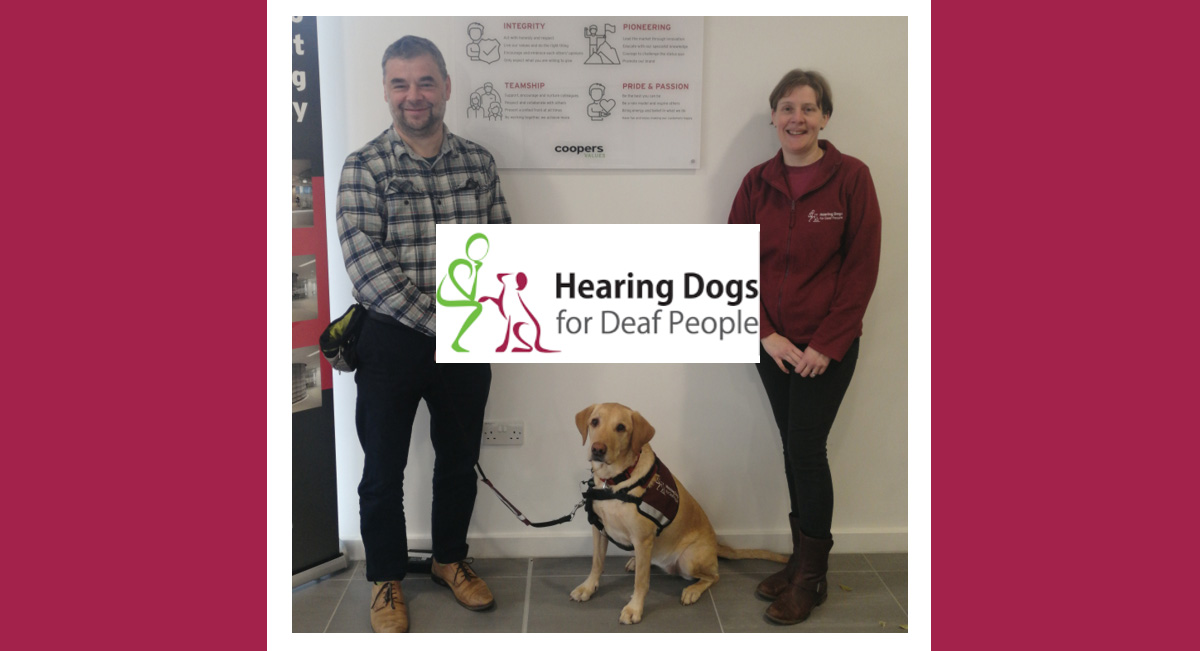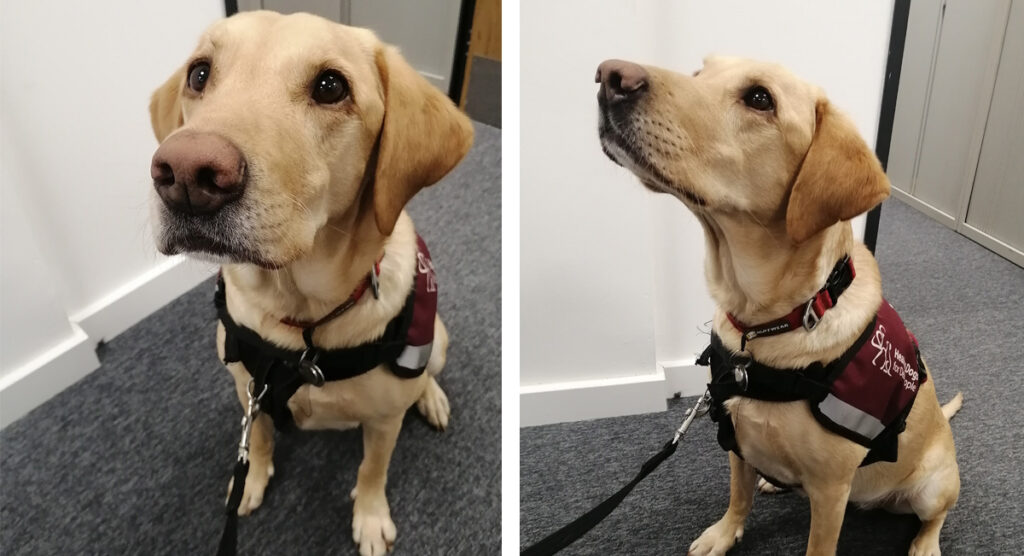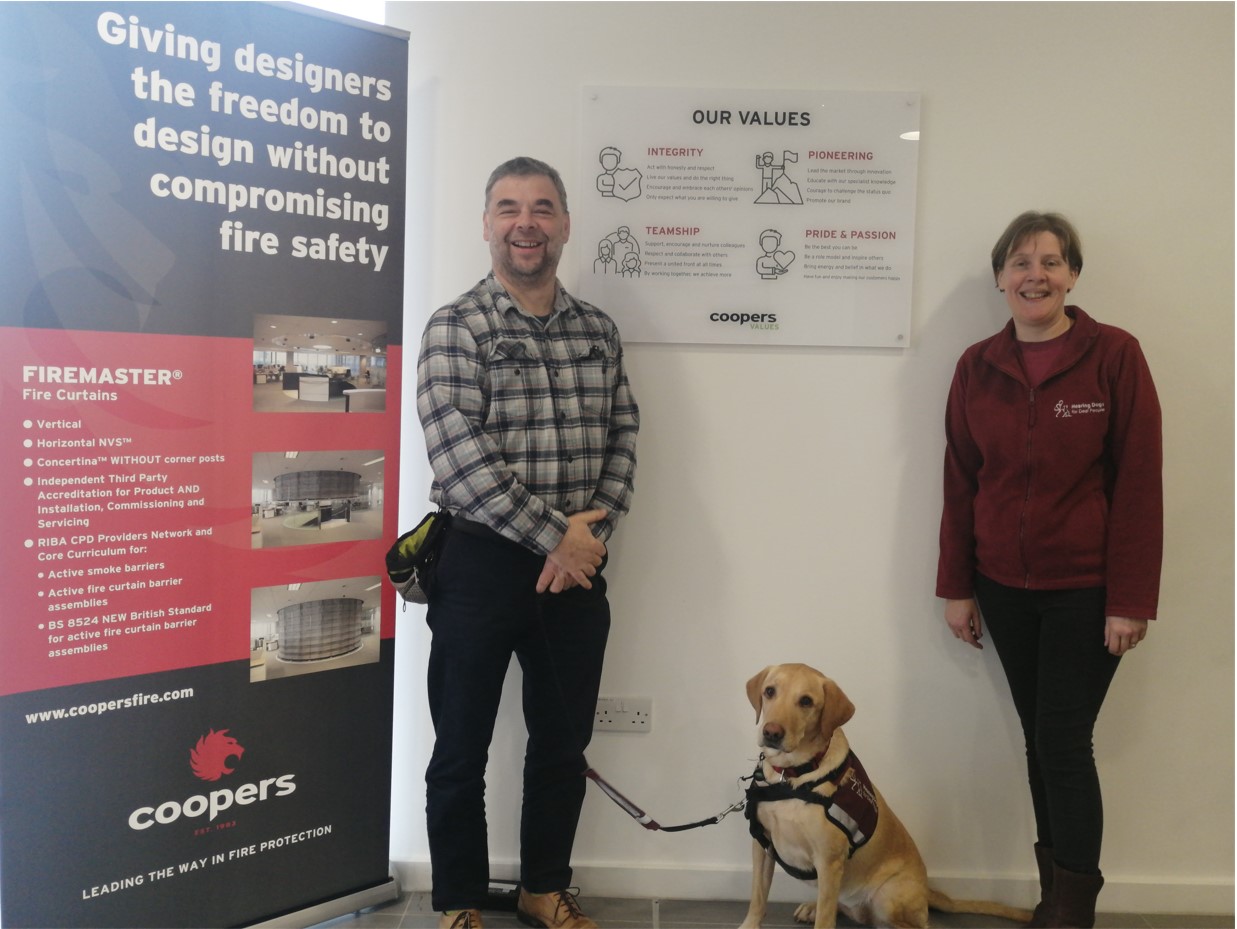In February Coopers Fire raised £313 for Hearing Dogs for Deaf People.

In February Coopers Fire raised £313 for Hearing Dogs for Deaf People.

In February Coopers Fire raised £313 for Hearing Dogs for Deaf People.
In February we had a very special new starter at Ignis House. Dan Wallace joined the Cooper’s team along with his Hearing Dog Bonnie (pictured below). Bonnie was paired with Dan through the charity Hearing Dogs for Deaf People. In celebration and honour of our new four-legged friend we raised a fantastic £313 for Hearing Dogs for Deaf People.

Since Hearing Dogs for Deaf People was founded in 1982 they have matched thousands of dogs, like Bonnie, with deaf people and currently have almost 1,000 working hearing dog partnerships across the UK. The cost to train and support each hearing dog throughout their lifetime is £40,000 and Hearing Dogs for Deaf People rely heavily on supporters to raise these vital funds.
Hearing Dogs for Deaf People train dogs to alert deaf people to important and sometimes life-saving sounds that they cannot hear and would otherwise miss. Sounds that many of us would take for granted such as a doorbell, alarm clock and even danger signals like the fire alarm. Being aware of these – thanks to a hearing dog – makes a real difference to deaf people’s lives, and can even save lives.
Training a hearing dog starts when a puppy is just a few weeks old. From eight weeks of age to around 16 months old, hearing dog pups stay with a volunteer puppy trainer. Puppies will receive most of their obedience training from their puppy training volunteer. At different stages of their training, puppies must pass Hearing Dogs awards called Puppy Stars! Hearing dogs learn to alert to sounds like the doorbell, telephone alerts, digital timers, alarm clocks and fire alarms. Dog trainers teach in specialised training houses so hearing dog pups can learn how to apply the majority of their soundwork skills in different everyday situations. The dogs will begin to understand which sounds require which reactions and quickly pick up the sounds they are to alert to. Dogs are trained to alert to a sound in a number of ways. Smaller breeds like Miniature Poodles and Cocker Spaniels will alert by placing both their paws on their deaf recipient’s lap. For larger dogs, or for smaller dogs who may be going to a deaf person with stability issues, they will alert through a gentle ‘nose nudge’ on their recipient’s leg. Depending on the sound, a hearing dog will either lead the deaf person to the sound after alerting them. Or, if it’s a danger signal like a fire alarm, a hearing dog will lay down – to avoid a dog leading someone into an unsafe situation.
The matching process is also an important part of a Hearing Dogs journey. At this stage, the partnership team will start to decide which deaf person the pup could help the most. There are a number of requirements and circumstances the team take into consideration to maximise the chances of creating a great match. Matching a deaf person with the right hearing dog is a lot like finding love – someone’s ‘Prince Charming could be totally wrong for somebody else! Once a match is found training can be tailored to the deaf person’s needs. This can be anything from more practice in a busy town if the applicant works in a bustling area, to increasing the interaction with children if the applicant has kids. Another example would be travelling on public transport more if that’s how a deaf applicant gets about.
The Puppy Four Star is the final training stage a hearing dog will pass. Once they pass this star, they will be tested for their hearing dog accreditation. The team ensures the puppy is happy and confident performing all of their training in different environments. Pups will also be tested on their soundwork, general obedience and their behaviour out in public. The charity’s involvement with a hearing dog partnership never ends and they are always on hand to help, support and advise the partnership throughout the dog’s working life.
In many cases Hearing Dogs don’t just alert their deaf partners to sounds, just as importantly, they also provide emotional support. Deafness can be a very isolating disability. A hearing dog can give a deaf person a newfound sense of independence and confidence now they have a loyal companion and a true friend by their side. Through the constant companionship they provide, they give deaf people confidence to reconnect with their family, friends and community, and embrace the life they want to lead.
As if all of this wasn’t enough – hearing dogs have saved countless lives in their important role; fire alarms sounding at the dead of night, alerting them to the shouts of a loved one who is in peril, even saving their deaf partners from potential car thieves!
You can find out more about Hearing Dogs for Deaf People and the work they do on their website www.hearingdogs.org.uk
Well done everyone at Coopers and welcome to the team Dan and Bonnie.
